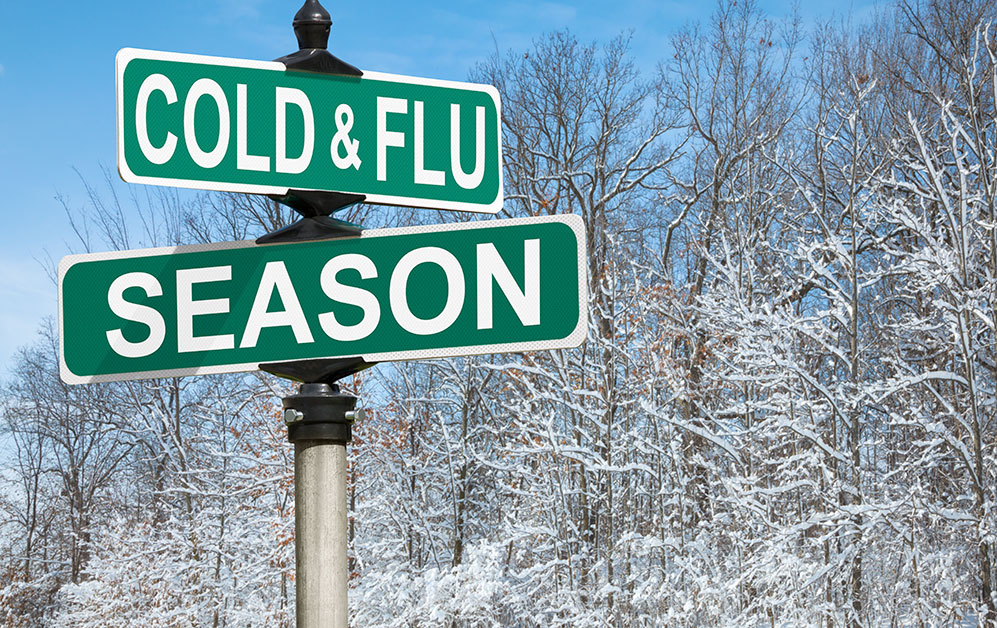Tips for Fighting Colds and Flu

Once again, it’s cold and flu season – do you know how to defend yourself?
Seniors tend to have weaker immunity than younger adults, making them more vulnerable to catching contagious illnesses. And, once older adults become sick, they also recover more slowly. If you are a caregiver as well, the stress of that role can also reduce your immunity.
Colds and flu (or influenza) are both caused by viruses. They spread through the air when a person who is sick talks, coughs or sneezes. According to the Centers for Disease Control and Prevention in the United States, the tiny drops of mucus they emit can spread as far as six feet. You can become infected if the droplets get into your nose, eyes or mouth, or if you touch your face with your hands after touching an object that has germs on it.
Although it’s sometimes hard to tell whether you have the flu or a cold, there are differences. If you are unlucky enough to be infected, you will experience these all-too-familiar symptoms:
- Colds: sore throat, runny nose, congestion, cough, sometimes a slight fever; symptoms develop gradually
- Flu: fatigue, sore throat, fever (not always), chills, muscle aches, headaches, cough, congestion, runny or stuffy nose; symptoms tend to develop abruptly
The flu is more severe than a cold. A cold lasts seven to 10 days, and the flu lasts five to seven days after symptoms begin. People often continue to cough and feel weak and fatigued for a few weeks afterward.
Health complications
In serious cases, a cold or the flu can lead to serious complications, including a lung infection called pneumonia. Older adults, the very young, people who have chronic illnesses (such as heart disease or asthma) and pregnant women are especially at risk, because they have weaker immune systems. People in high-risk groups who develop flu symptoms should see their physician early in their illness. Physicians may prescribe antiviral or anti-influenza medication.
Certain symptoms may require emergency care. The Centers for Disease Control and Prevention in the U.S. advise that if an adult experiences shortness of breath, pain or pressure in the chest or abdomen, dizziness, severe or persistent vomiting, confusion, or flu-like symptoms that seem to get better but then return with fever and a worsened cough, they should seek medical help as soon as possible.
Prevention is the key
Here’s how you can bolster your defenses against cold and flu germs this season:
- Get the flu shot. According to health authorities in Canada and the United States, everyone aged six months and older should get the flu shot each year. This is the best way to prevent the flu and to avoid infecting others. If you do get the flu, the vaccine can reduce the severity or duration of the illness. The flu vaccine is very safe. You can’t get the flu from the shot, and most people do not experience side effects. (There is no vaccine for colds).
- Avoid people who are sick. This might seem obvious, but it can be difficult to reduce exposure if you live in a setting such as a retirement home. Germs can survive on surfaces for up to eight hours. Protect yourself by washing your hands often and disinfecting frequently touched surfaces, such as doorknobs, light switches, telephones, remote controls, computer keyboards and elevator buttons. Don’t share items such as hand towels, drinking glasses, cutlery, etc.
- Practise proper handwashing. Using warm or cold water, wet your hands and apply soap. Lather your hands thoroughly – including between your fingers, the backs of your hands and under your fingernails – for at least 20 seconds. Rinse your hands under running water and dry them on a clean towel. Always wash your hands before preparing food or eating, after using the washroom, handling garbage, touching animals, blowing your nose, coughing, sneezing, touching other people or providing care to someone.
- Get enough rest. Poor sleep can dampen anyone’s immune system. Older adults already tend to have lower immunity, so getting adequate rest is very important. Stress can also take a toll on the body’s defenses, so try to reduce stress however you can.
- Raise the humidity. In fall and winter, the air can become very dry, and that allows the flu virus to survive longer and spread more easily through the air. A humidifier can make breathing indoor air more comfortable and help keep the flu at bay.
- Exercise regularly. Staying active strengthens the immune system, helping you to fend off illnesses.
- Eat a healthy diet. To support immunity, include plenty of antioxidant-rich fruits and vegetables in your diet, such as bell peppers, citrus fruit, garlic, broccoli and sweet potatoes.
- Stay hydrated. Drinking water will help keep your nasal passages moist, which helps stop cold and flu germs in their tracks.
Additional resources
Flu (influence): Prevention and risks (Government of Canada)
Flu clinics across Canada (Government of Canada)
CANImmunize app (vaccination tracking for iOS and Android devices)
